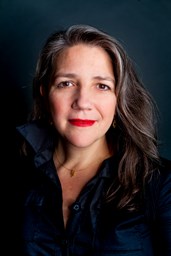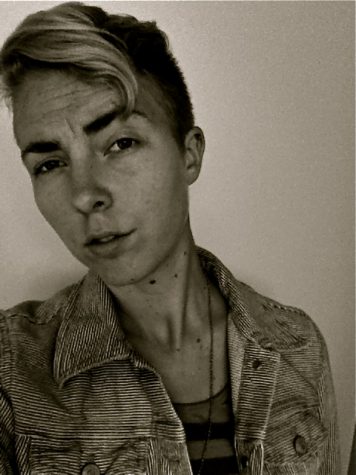Poets to speak on gender, sexuality

Marty McConnell
The Shield interviewed poet Marty McConnell who will present her work with Meg Day at a poetry reading sponsored by the Department of Communications, Gender Studies Program, Sexuality and Gender Alliance and Southern Indiana Reading Series at 7:00 p.m. March 20 in the Griffin Center.
The Shield: When did you start writing poetry?
Marty McConnell: I’ve always written since I was a little kid, but I first started to (get) into it when I was just out of undergrad. I started going to open mics and things like that, and I really found a community around poetry and people who could help me get better at it and pay attention to it and who loved it like I did. I was twenty one at that point, and I have just kept on since then.
The Shield: What about poetry stuck out to you?
McConnell: For me, it’s always been a way to condense and communicate experiences. As a kid, I was in theatre, and I always loved writing and so it felt like when I came across poetry, pretty soon after, I started writing a lot more in my twenties. I also started performing poetry a lot more, and that really brought together these two things that I loved to do. So for me, it’s always been a combination of written form and also a spoken form that can be transmitted in that way.
The Shield: Did you always perform your poetry?
McConnell: I really have. For me, the most interesting intersections are between the written and the spoken and the ways in which on the page we can receive information in a certain way because we get to spend a lot of time with it and we can really unpack its layers in a different kind of way. And hearing poetry out loud, we can transmit a different kind of information, because we’re present. Even in my writing process, I read aloud just to myself to hear how the language hits the air, and how it sort of bounces of the world in different ways.
The Shield: When did you first read one of your poems to an audience?
McConnell: When I first started going to this one open mic in Cincinnati I would, with some regularity, get up the open mic with a poem and halfway through, decide I didn’t like it. Fortunately, it was this really supportive and loving community and they were like, “You should just read the whole poem, that’s okay.” It was formative in the sense that it encouraged me to get vulnerable.
The Shield: Are there certain subjects you like to use in your poetry?
McConnell: I tend to write in series. So my first book had a couple of major concepts where it was very focused on looking at different aspects of sexuality and gender expression…and there was also just a lot of working through personal and individual family history. And with the book that just came out, I was really interested in exploring the questions of damage and vulnerability to damage. Looking at the ways in which I inflict damage on the world walking through it as a white person, as a person who has a whole litany of privileges and also the damages to which I am vulnerable as someone who views the world as a female, queer-bodied person. All of that intersects with this particular moment in the history of our species as we start to start looking at climate change as a possible species collapse. There are certain topics that arrive and get intertwined and those become the book. I work at the theme. I overwrite. I write way more poems than are ever going to end up in print. From there, I’m able to snuff out what it is that I think and believe and want to say about these things.
The Shield: How does poetry help you shuffle through these subjects?
McConnell: What happens is the poems end up requiring me to tell the truth in a way that often informs me about truths I did not already know. Sitting down to write is this delicate balance between surrender and control, especially when I’m in the throws of being obsessed with a particular topic. It’s a very individual process where I’m alone and writing, and I’m in the community. I’m in discussions with friends and colleagues who are kind enough to look at the works and give me their thoughts about them and to push and prod them into higher and deeper levels of truth and vulnerability and honesty.

Meg Day
The Shield: How does it feel to read your poems to an audience?
McConnell: It’s one of my most favorite things in the world, to be able what I have created in a fair bit amount of isolation and be able to share that with people and to feel that electric connection. The poem becomes a kind of cord between the speaker and the listener by which the experience gets shared and, to me, it’s always fascinating because there are some moments where that connection is of a shared experience. And there’s that connection that says, “Oh, I too have felt that” or “I have experienced that” or “I’ve thought about that, but I’ve never thought about it in that way.” There’s a different kind of connection when it’s with an audience member who has had a certain kind of experience or has these thoughts about something or disagrees with something. And that’s a different kind of energetic connection that we transfer in those moments. For me, a lot of the joy lies in being open to all of that and being privileged to be able to experience that through poems live with other people.
The Shield: What will USI students get out of this event?
McConnell: My hope is that they are provoked in an entertaining kind of way. I think one of the things that poetry can offer is a productive discomfort. Sitting in a space with each other and having a shared experience that is not necessarily based on believing all the same things or thinking all the same things or having gone through all the same things, but having our collective willingness to be able to be together in art and in feeling and to be open to that and be opened by it.
